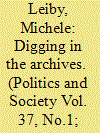| Srl | Item |
| 1 |
ID:
086650


|
|
|
|
|
| Publication |
2009.
|
| Summary/Abstract |
This article explores the methodological obstacles to research on wartime sexual violence and the extent to which they can be overcome with archival research. It discusses issues of concept formation, counting victims of human rights abuse, and coding violations. It compares figures from the Peruvian Truth and Reconciliation Commission's final report, an analysis of the Commission's published materials, and an analysis of the primary documents and finds that (1) the number of reported cases of sexual violence is significantly higher than the 538 cited by the Commission, (2) men were more often the targets of sexual violence than previously thought, and (3) sexual humiliation and sexual torture were common practices during the war
|
|
|
|
|
|
|
|
|
|
|
|
|
|
|
|
| 2 |
ID:
140802


|
|
|
|
|
| Summary/Abstract |
Human Right Organizations (HROs) attempt to shape individuals’ values and mobilize them to act. Yet little systematic research has been done to evaluate the efficacy of these efforts. We identified the three most common messaging techniques: (1) informational frames; (2) personal frames; and (3) motivational frames. We tested their efficacy using an experimental research design in which participants were randomly assigned to the control group (shown no campaign materials) or one of the treatment groups shown a campaign against sleep deprivation featuring one of these framing strategies. We then surveyed participants regarding their attitudes and their willingness to act. Results demonstrate that all three framing strategies are more effective at mobilizing consensus than action. Personal narratives are the most consistently successful, increasing individuals’ sense of knowledge on the issue and their emotional reaction to the issue, leading them to reject the practice and participate in a campaign to demand its cessation.
|
|
|
|
|
|
|
|
|
|
|
|
|
|
|
|
| 3 |
ID:
165430


|
|
|
|
|
| Summary/Abstract |
While we know that war can have wide-ranging consequences for life expectancy, social capital, and political participation, we know little about how wartime violence affects intimate relationships. Existing literature suggests that conflict violence could increase the risk of intimate-partner violence, but lacks compelling statistical evidence to evaluate this claim. We test this proposition with newly available data on conflict-related violence and the Demographic and Health Surveys data on intimate-partner violence in Peru. We find that exposure to general conflict violence significantly increases the risk of intimate-partner abuse and that these effects are particularly pronounced for conflict-related sexual violence. This information should help policy makers and practitioners improve the efficacy of domestic violence prevention programs by identifying and targeting populations most at risk.
|
|
|
|
|
|
|
|
|
|
|
|
|
|
|
|